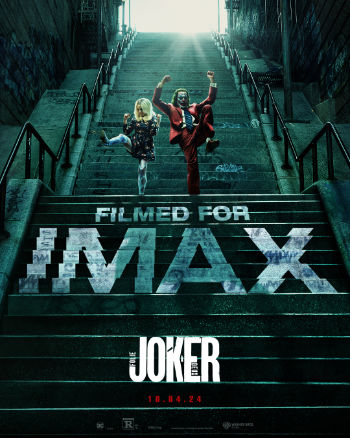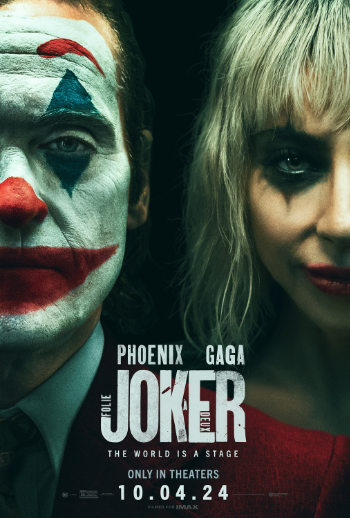Movies

New Releases • A-D • E-H • I-P • Q-Z • Articles • Festivals • Interviews • Dark Knight • Indiana Jones • John Wick • MCU
A Musical? You’ve Gotta Be Joking
Joker: Folie à Deux, starring Joacquin Phoenix and Lady Gaga
Trailer: Warner Bros.
Joker: Folie à Deux
Directed by Todd Phillips
Rated R
Cracked 4 October 2024
#Joker • #IMAX
Joker: Folie à Deux is a remarkable, risk-taking sequel with a lot on its dark and twisted mind.
Two Hearts Beat as One

It’s breathtaking the way Folie à Deux starts to travel down the path pretty much the whole world is expecting and then takes a sharp turn, driving off the road and down a rocky hillside. But writer/director Todd Phillips has a steady hand on the wheel. He doesn’t ignore the obvious choices, the storylines that have already been told many times over. He sees them. He waves at them. He flips them off. The end point he has in mind is far more interesting than the original path of popular expectations would have provided.
Arthur Fleck, aka Joker, meets Lee Quinzel, aka Harley Quinn, in the dreary wards of Arkham Asylum.
This is not a "meets cute" love story. Hardly. He’s crazy. She’s nuts.
Who could ask for anything more?
Especially when Joker is Joaquin Phoenix (Walk the Line) and Harley is Lady Gaga (A Star Is Born).
Yes. It is a musical. But it’s not wall-to-wall song and dance. It’s a very thoughtful, clever musical featuring time-period appropriate songs that knows its lead characters aren’t a couple of plucky young kids looking to get out of the ‘hood, make a name for themselves and then payback their devoted, loving parents by buying them a mansion.
Oh no. This pair, they’re trouble.
You May Be Right (I May Be Crazy)
What Phoenix has done with Joker is already well known. He won the Oscar for his raw, transformative performance that treads fresh ground from those before him: Heath Ledger (who won a posthumous Oscar for his version in The Dark Knight), Jack Nicholson, Jared Leto (cringe) and Cesar Romero.
But what about Lady Gaga?
Brilliant.
Her Harley is not the mallet-swinging loudmouth trash-talker that’s commonly depicted. That’s to take absolutely nothing away from Margot Robbie, who – every time she does herself up in the pink and blue pigtails – makes Harley worth watching in every frame, no matter how bad the rest of the movie is around her. Nor is it a slight against Kaley Cuoco, Melissa Rauch, Christina Ricci and many others who’ve provided their lungs to the character in animated, podcast and other versions.
Lady Gaga’s Harley goes to the roots of a complicated, troubled woman, completely distancing her from the caricatures of yore. This Harley’s a dangerous cocktail of self-curated fantasy and a respectable upbringing. Plus, she has a Master’s in Psychology and she’s studied up on Arthur. She’s a fan. A big fan. But Arthur’s warned he can’t trust a word she says.
And Lady Gaga’s the perfect choice to bring her to life. She’s one of the rare talents who can – with the curl of a lip or an eyebrow – shift from seductive to sinister. And when she does it here, it’s chilling.
This Harley can be as cold as ice.
Sometimes a Fantasy
As for the music, Folie à Deux is actually a touching salute to its power. Its power to heal the mind, to lift the soul. The natural association is with good people. Heal the minds of good people. Lift the souls of good people. But, surely the effects are every bit the same on the bad, dark-hearted people.
Aren’t they?

This is not a bombastic display of Joker and Harley breaking into song with the rest of Gotham performing spontaneously synchronized dance moves on the dirty city streets. No. The approach here is akin to Rob Marshall’s movie version of Chicago. It’s all in the mind. And in IMAX, the scope shifts to the large format when Arthur and Lee mend their broken hearts and minds through music.
And what a couple damaged minds harboring those songs, which include standards from Frank Sinatra, The Carpenters and the movie musical The Band Wagon, starring Fred Astaire.
Oh, the irony to think Harley and Joker get to watch The Band Wagon at Arkham based on their good behavior. But she invites him to leave early. Why? They have nowhere to go, he says. She counters, they both know how the Hollywood movie will end. Happily. Ever. After.
So, Harley – perhaps taking a cue from the real on-stage theatrics of Lady Gaga – sets a piano on fire as a distraction while they make an escape.
Or at least they try to.
Unlike those star-studded, joyous Hollywood musicals, Arthur and Lee struggle to find their happy ending. Instead, he’s deemed competent to stand trial for those five murders of which he’s accused – including one broadcast on live television – and he’s facing the death penalty. For good measure, he confesses to a sixth, his own mother.
And Harvey Dent (Harry Lawtey, Industry) is the prosecutor.
Brazil
This is every bit as much a psychological character study as Joker. Arthur’s been depressed (no doubt a standard condition for Arkham denizens) and even his guards need to coax the jokes out of him. It’s with the music – and love – that Arthur finds a new lease on his troubled life.
The goal – whether spoken or merely in the mind – of both Arthur and Lee is to "give the people what they want." That’s clear enough in the greater context of Gotham and Batman history. Bring mayhem to the city, spiced with their outsized taste for the theatrical. What a stage that world of Gotham is, to boot. But what about the reality of their situation? What if they can’t?
That’s where Phillips tears down some of those lofty expectations and instead offers a harsh reality check on what this duo can actually accomplish. As Arthur takes on his own defense, there are some interesting thoughts on the justice system. The fixation is on what he was like, not what he is like now. And now that’s he wanted – in a totally different way from those posters in the post office – he’s got a new reason to live a legitimate life.
Or, at least, so he thinks.
Folie à Deux continues the decidedly 1970s cinema aesthetics of the first installment and, while Joker was plenty bold, this one ups the ante with a jaw-dropping conclusion that, despite all the mayhem and murder Gotham is known for, is strangely tragic and heartbreaking.
Sympathy for the Devil
Wow. What a disappointing public response to Folie à Deux. The opening weekend domestic box office of $37 million was only slightly more than half of original projections, which were pegged around $70 million. And that was followed by a potentially record-breaking second weekend collapse north of 80%, yielding only $7 million.
It says a lot about fanbases. It says a lot about keeping things in a box. It says a lot about stifling creativity and alternative visions.
Most certainly Indiana Jones has been similarly victimized by uninformed responses to Crystal Skull (yes, saucer men from Mars make sense following the original, epic vision for the archaeologist) and Dial of Destiny (archaeology is a form of time travel). But those responses pale to the complete rejection of this Joker sequel.
Todd Phillips wasn’t flipping off fans, he was flipping off the storylines that have already been told. Many times.
How about a different take? How about a sequel that does something fresh with the characters? For all the times it's reported audiences want something different - and sequels that aren't simply more of the same - too many times earnest efforts to provide precisely that are quickly dismissed.
Consider all the hype around the multiverse concept in both DC and Marvel.
Consider the first Joker movie and who Arthur Fleck was even then. A frail, mentally sick man with virtually no resources. He’s not a leader. He’s not a criminal mastermind. And yet audiences lapped it up to record-breaking numbers and it was even awarded with Oscars.
In Folie à Deux, Phillips didn’t change course for his vision of the Joker, one completely detached from all the others, including Jack Nicholson’s, whose Joker also met a controversial fate in 1989’s Batman, but under wholly different circumstances. Within the context of Phillips’ Gotham, one in which the Wayne Enterprises tower looms on the Gotham skyline and Harvey Dent is a rising superstar prosecutor, Batman is an unseen and even unnamed force.
This Joker was never going to be able to challenge a billionaire vigilante, even with the mayhem of Joker’s own fanbase, his unofficial agents of chaos who also had no resources of any significance. They were hooligans running in the streets. In theory, GoFundMe would shut down any efforts to collect donations to fund efforts to bring Gotham down on its knees.
Much like Megalopolis, it’s a shame audiences kick to the curb experiences that are a little challenging, that take things from a different angle. But it’s a phenomenon that’s increasing in frequency, even outside the world of movies. People don’t want to be open-minded. They want the comfort of the familiar, of what they know to be true (even if it's not). That leaves nothing but an immediate, knee-jerk reaction, which oftentimes includes demonizing opposing opinions and those who ask questions and challenge the status quo (which are also fundamental themes in both Folie à Deux and Megalopolis).
Apparently, Todd Phillips is the devil because he didn’t do the obvious. He didn’t lead Arthur and Lee down the path of the criminal underworld. He didn't give Harley her mallet. He didn't succumb to the comic book tropes.
But he did something even more powerful. He made the Joker a sympathetic character. It fits in this version of Gotham, in this vision.
It’s kinda funny. I ripped on The Devil Wears Prada for making Meryl Streep's Miranda Priestly sympathetic. That movie adaptation had many other problems, to boot. I referred to it as The Devil Wears JC Penney. But some people praised it and still refer to it as a great movie.
And yet here, in the context of a multiverse that would logically support Phillips’ characters and that is in no way connected to any other current DC cinematic storylines, including Matt Reeves’ The Batman, the public has deemed this sympathy for the devil as completely unacceptable.
• Originally published at MovieHabit.com.


